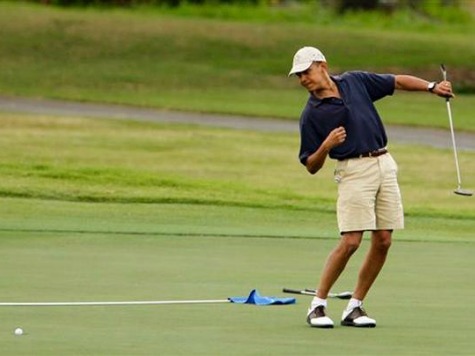Hours after giving a speech at the White House on Saturday about America’s long-term strategy to combat Islamic extremists in Iraq, President Barack Obama vacationed in Martha’s Vineyard and hit the golf course.
Obama golfed with Ahmad Rashad, Cyrus Walker, and Ray Allen. Surprisingly, Marvin Nicholson was not there. Former Alaska Governor Sarah Palin has said Obama golfs during scandals and crises because he is in over his head. And Michael Hirsh, writing in Politico Magazine, noted that “what tells us even more about this particular president than his escapist passion for golf, however, is his routinely narrow choice of playing partners over the past five and a half years.”
Though golf “is probably the most social of sports,” Obama often plays with the same group of people:
Yet in five and a half years of slashing his way through courses from Maryland to Hawaii, Obama has managed to turn this most gregarious of games into an intensely private obsession, one he has shared almost entirely with the handful of close friends–many of them old high-school pals from Hawaii–and White House aides he asks into his foursome. Mostly, he plays with junior White House aides. So Obama spends most of his time with golf partners he not only doesn’t have to persuade–he doesn’t even have to talk to them.
Obama has played the most with ‘Nicholson, the White House trip director (they’ve played together 133 times), followed by David Katz, the 29-year-old White House senior policy adviser for manufacturing, and Eric Whitaker, Obama’s old Chicago friend. Not far behind in frequency is Ben Finkenbinder, a young White House press staffer.”
Hirsch also writes that it is “fair to question whether his isolationism on the course reflects his entire approach to leadership.”
“This president who once billed himself as an intellectual seeker has largely cut himself off, while in office, from new ideas and new discussions,” he writes.
But after a “sloppy” debate over Afghanistan early in his administration, Obama has not engaged in such debates with the cabinet. In addition, “Obama has, again and again, demonstrated that he relies on a set of advisers that is as narrow as his selection of golf partners–trusted consiglieres like Valerie Jarrett and Denis McDonough (who as deputy national security adviser could sometimes be found conferring privately with the president to the consternation of McDonough’s boss, first-term national security adviser Jim Jones, a big-name former general who never had the key to the Obama inner sanctum).”
“He doesn’t have the experience of hearing his read on events directly challenged across the board,” a “long-time ally” told Hirsh. “And as his presidency has hardened in the arteries, Obama has grown ever more “fatalistic” about his isolated position–hastening his retreat from world events as well as Washington horse-trading.”
Because of his rapid rise in national politics and his “brilliance as a candidate, his phenomenal ability to arouse huge crowds with inspiring speeches,” Obama “didn’t have to get down from the podium to do much glad-handing on the trail (in 2008 he famously complained to his staff of “too many rope lines”), or back-room dealing.” And he “also never had to learn the basic skills of socializing with his political enemies.”
In the White House, Obama has shown again that he doesn’t “have the schmooze gene,” in the words of Jonathan Alter:
From the time he was a boy, his sense of apartness had bred a hardened self-reliance, and he lacked the “neediness” for the affirmation of others that is usually central to a politician’s makeup, Alter argues. And it was hardly just the Republicans who felt put off: “That was the essence of the problem that Democratic politicians had with him – that he floated above the fray.”
And though Obama complains about Republicans who do not want to compromise, Hirsch writes that the “problem is that this president doesn’t seem to possess the skills or the desire to get enough votes–full stop.”
“He certainly hasn’t tried very hard to woo wayward members of the opposite party, as many presidents before him have done,” he notes. “And he’s certainly not going to make much progress by spending five hours a day addressing a little white ball–and no one else–on Martha’s Vineyard.”

COMMENTS
Please let us know if you're having issues with commenting.